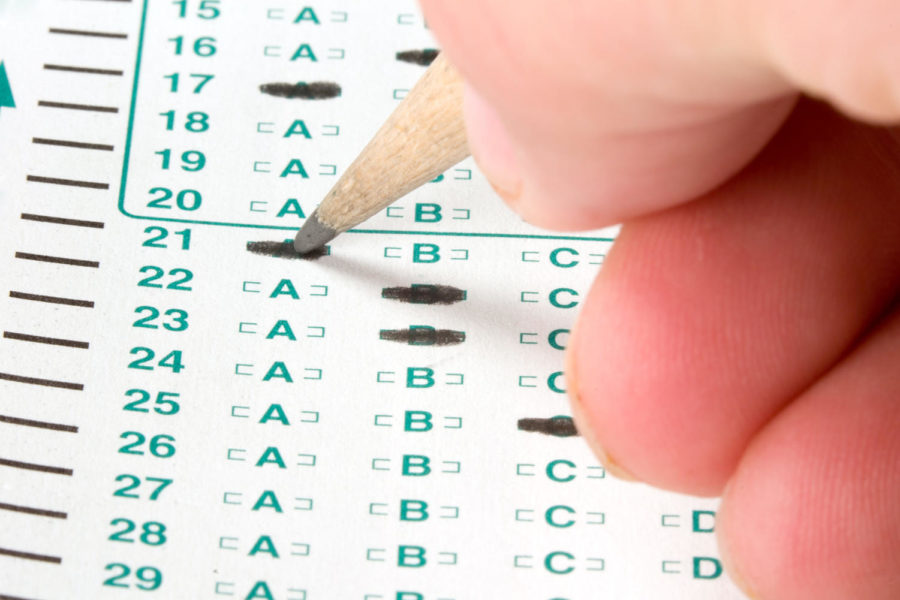Diwate: Test methods should be challenging
Traditional multiple choice testing methods that have been used for standardized tests like the ACT and SAT may not be the best way for students to learn.
March 8, 2013
In one of my classes, the instructor asked the students to answer a question about something taught just a week ago. The question was no different than one you would see on any other test, but there were no options. Surprisingly or unsurprisingly, none of us could answer the question without referring to our notes.
The instructor said, ”This is learning by recall. It is quite different than something you usually have, i.e. recognition or selecting the right answer in a multiple-choice test.” I thought: Isn’t this how most of the tests are evaluated now, with filling out bubbles? It really got me thinking on the emphasis or near dependence on multiple-choice question testing.
The bubble-filling tests are ubiquitous. Be it a short weekly quiz or an hour-long final, you need to keep your pencils ready. Courses with minimal writing have become the norm. Standardized tests like the SAT and ACT have also concentrated on multiple-choice questions for a long time.
For those who support (or like) the bubble method, it is about using objective results to determine how students fare in tests. To-the-point and true or false questions get rid of the scoring ambiguity associated with essay-type questions.
Perhaps the multiple-choice testing format benefits an integral component of the testing process more than the students: the test administrators. Scoring bubble sheets with computers does not take as long as going through individual answers, long paragraphs and deciphering obscure handwritings. It also turns out to be a cost-effective option, as it eliminates the human component.
For students, the biggest advantage is that we just need to recognize (or guess) the right answer instead of knowing it. This has in turn spurred new study techniques. Many students have gotten to the point of skimming chapters as they are sure that they would still be “be able to recognize or guess the right one.”
Some students try to answer through the given choices or back-working. Others among us are “expert guessers” who can possibly answer a question correctly with minimal knowledge about the concept.
I doubt if shallow reading sufficient to pass a test can contribute to deeper understanding of concepts. Also, can students can really gain enough knowledge of a college course that they can pass with substantial help from smart test-taking strategies?
I would say the bubble method is not perfect when many college students I have seen cannot spell words they are expected to know at the college level. They also misspell or miss punctuation when they need to write without spell-check. Given that we use computers and spell-check to a greater degree in our daily life, do we still want to see a college graduate struggling to write a coherent sentence with correct spellings on paper?
Exactly a year ago, I was busy learning answers for my senior-year finals in India. There were definitions and long answers with examples to be learned by heart. Though I was not fond of this type of assessment, it was definitely not easy.
This was for a number of reasons. It was a long, three-hour writing marathon. It was common to miss a question or two as the time mostly seemed to be insufficient. The exam had both objective and long answers based on a semester- or year-long syllabus. And spellings or bad handwriting could dent the final score.
Still, I can tell you this system had its set of loopholes. Many of my friends were experts in expanding a sentence into two paragraphs with a lot of jargon and useless examples. The examiner often used to judge an answer by its length. So there was a lot of incentive to cram in as many words as possible in a single answer.
I won’t argue that long-form writing is the best assessment method today. Times have changed and so have ways of retrieving information. A Google search is more efficient than reading an entire book to find a single answer.
However, there still needs to be a system in place that ensures we remember what we learn. I would settle for a hybrid assessment of both essay and multiple-choice questions, as some classes already use this method of assessment.
Ultimately, filling out bubble sheets should not be the goal of the knowledge acquisition process.
——————————————————————————————-
Varad Diwate is a freshman in journalism and mass communication from Nashik, India.

















